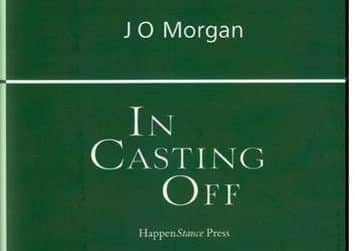Book review: In Casting Off by JO Morgan


Is the long-form poem making a comeback? The high-profile success of Mercury Prize winner Kate Tempest’s Brand New Ancients a couple of years ago certainly suggested that there might be a market for book-length poems beyond re-translations of Homer and Beowulf. In Edinburgh this August it was intriguing to see slam poets like Sara Hirsch and Jemima Foxtrott experimenting with the possibilities of fully realised narrative works designed to fill an entire 50-minute Fringe slot. Comeback is probably too strong a word, but as our culture continues to fragment, and as we continue to engage with it in increasingly fragmented ways, the long-form poem, with all its scope for multiple perspectives and styles, starts to seem far better-suited to our times than the novel.
Based in the Borders, the poet JO Morgan first came to prominence in 2009 with “Natural Mechanical” – a long-form poem about a friend’s childhood on Skye, in which the hero escapes his troubles at home and at school to find solace – and an education – in the natural world. Simon Armitage called it “a gem of a poem” and it won that year’s Aldeburgh Prize for First Collection. The sequel “Long Cuts”, published in 2011, saw the nature-loving boy become a man, and in 2013 Morgan published “At Maldon”, a reimagining of The Battle of Maldon, one of the oldest poems in the English language, which recounts a clash between Anglo-Saxons and Vikings on the Essex coast in 991AD. That one was shortlisted for the 2014 Saltire Society Poetry Book of the Year Award.
Advertisement
Hide AdMorgan’s latest creation, a “poem-novella” entitled In Casting Off, is a love story of sorts, although at times the love between the fisherman and his wife that forms the centre of the tale feels more like an absence, a black hole. On their wedding day, the village is “abuzz with the new day’s rush” so that “No one considers the couple who blink / from the church out into breezy light.” The newlyweds simply “meld into the busyness, / where nothing has changed / where this day is no different / nor better in any way than the day before.” The pressures of the husband’s work mean he is often absent (even, sometimes, while present) and their relationship will face other challenges, too. Nevertheless, there is love there, although it is of the understated, real-world variety. The wife, worried that her husband has been lost at sea, comes “to linger / at the jetty’s far-out end” when he doesn’t return for three days. And when she becomes sick, he is there reading to her, feeding her, “squeezing her hand… combing her hair.”


The absence of anything even approaching conventional romance is perhaps indicative of the harsh world the couple inhabit – a place where death can come at any moment. The fisherman’s mother, we learn, lost her husband at sea several years ago, “Though with him / at sea all day and tired all night the change / was hardly noticeable, but for the extra work.” The wife’s brother, meanwhile, who helps out her husband on the boats one spring, is washed away by a wave and drowned; the explanation she is offered is, quite simply: “He was there / then he was not.”
Woven into the tale are multiple strands of symbolism, the most significant, perhaps, relating to skin – particularly of seals, bears and fish – and its removal. The poem’s title is ostensibly a reference to casting off the ropes that keep a boat fastened to the shore, but it could equally be read as a nod to the way in which the casting off of skin in the world of the fisherfolk often signifies a moment of transformation or a rite of passage.
This is a wonderful, nuanced portrait of two people journeying fiercely yet modestly through an arduous life together, and one that reveals new delights with each re-reading.